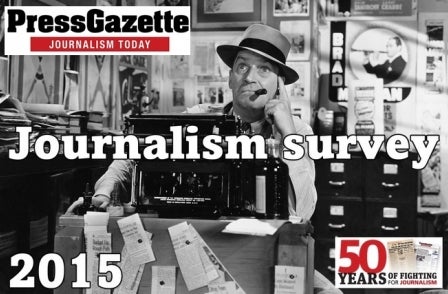
Several business-to-business journalists have expressed concerns over having to "kowtow to advertisers" in a Press Gazette survey.
Over the summer, more than 700 journalists took part in an anonymous online questionnaire, launched to mark Press Gazette 50th birthday.
Overall, 65 journalists who filled in the survey said they worked in B2B journalism.
Compared with other journalists, the results suggest B2B journalists rate their places of work higher, but fewer enjoy their jobs.
On average, they rated their places of work, on a scale of one to ten, at 6.7. The average was 6.6.
This figure is also higher than the other two sectors Press Gazette has so far broken down in coverage of the survey, with regional press journalists rating their places of work at 6.1 and news agency journalists at 5.9.
However, of the 715 survey participants, 87.6 per cent said they enjoyed their job, while 81.5 per cent of B2B journalists said they did. This compares with 84.5 per cent of regional journalists and 78.9 per cent of news agency workers.
As part of the survey, participants were also asked how much they earn. Of the staff B2B journalists who answered this question, none earned below £15-20,000 a year or above £50-60,000. The most common salary range was £30-40,000, which is in line with the overall average.
Answering the question “What concerns do you have about your place of work?”, seven survey participants suggested advertising has a inappropriate influence on editorial coverage.
One reporter said there was “pressure to kowtow to advertisers” and another complained of “sponsorship influence on reporting”.
One editor listed a problem as: “Pressure to choose editorial content based on commercial and advertising reasons rather than what readers will enjoy.”
An assistant editor said their publication is guilty of “compromise of editorial integrity to appease advertisers”
An editor said: “As far as ethical journalism goes, the journalists in the company have no say over what goes into the magazine – the content is dictated by the clients.
“If a journalist happens to think for themselves and write an investigative piece they are publicly humiliated in front of the office.”
Other complaints from B2B journalists centred on pay, job security and bullying. One reporter said: “We have performance-related pay, which is often used to add extra pressure. Our news editor recently started emailing round monthly lists of the most productive staff. I often feel stressed in the job.”
One journalist said: “I am concerned about the decline of standards with regard to the journalism we produce, often at the expense of speed and – occasionally – commercial concerns. I don't think we, as with many titles, have the resources to do all the things asked of us to a standard which I find acceptable.”
Several other B2B journalists complained about having to contribute non-editorial work. One reporter said: “My editor is coming up with as many commercial projects as she can to help boost the coffers but that means for the last 18 months there has been little or no focus on the newsdesk. All these new projects are piling on pressure to reporters who are tasked with doing so many different jobs they fail to become experts – which they should be.” Another complained of “pressure to do events rather than write”.
One journalist said: "There is a culture of bullying, alcoholism and backstabbing among a select few, which mostly resonates from the people who own the company.
"One of the owners encourages an alcoholic member of staff to drink excessively for his own amusement. The member of staff routinely becomes out of control at company events in front of clients, but is never reprimanded – [they have] become a toy for the chairman to play with."
Asked what they enjoy about their job, one reporter said: “Reporting. Meeting sources, chasing news, all the bits of the actual journalism job. It's the other things which annoy me.”
An Emap correspondent said they liked the fact “we only do exclusive stories and never re-hash press releases”.
A news editor said: “I like the fact that we still value off-diary, exclusive news. Not everyone can say that!”
Another news editor wrote: “We are backed to do good old fashioned investigative journalism. Not many places where that is still possible.”
Picture credit: Shutterstock
Email pged@pressgazette.co.uk to point out mistakes, provide story tips or send in a letter for publication on our "Letters Page" blog
